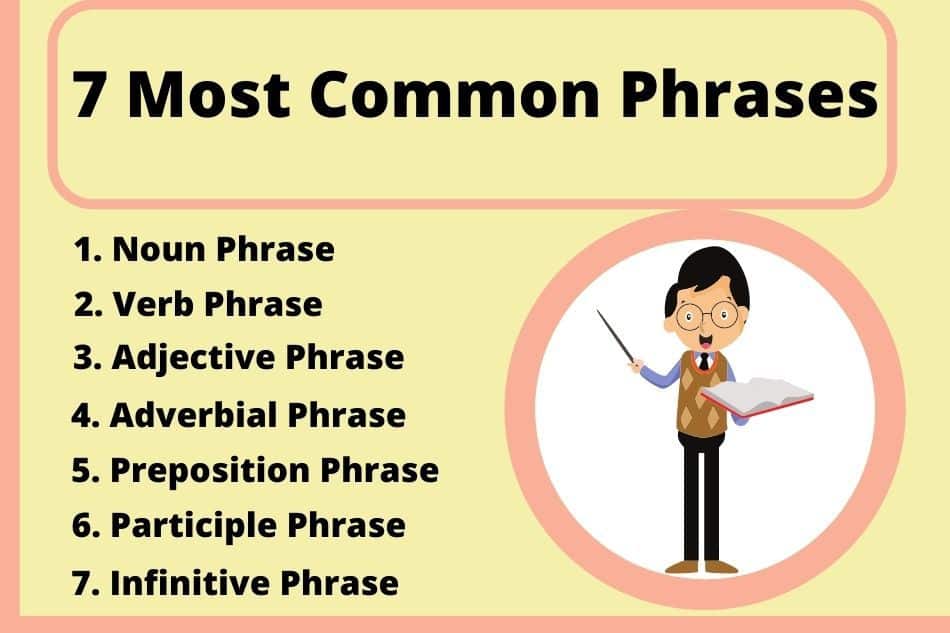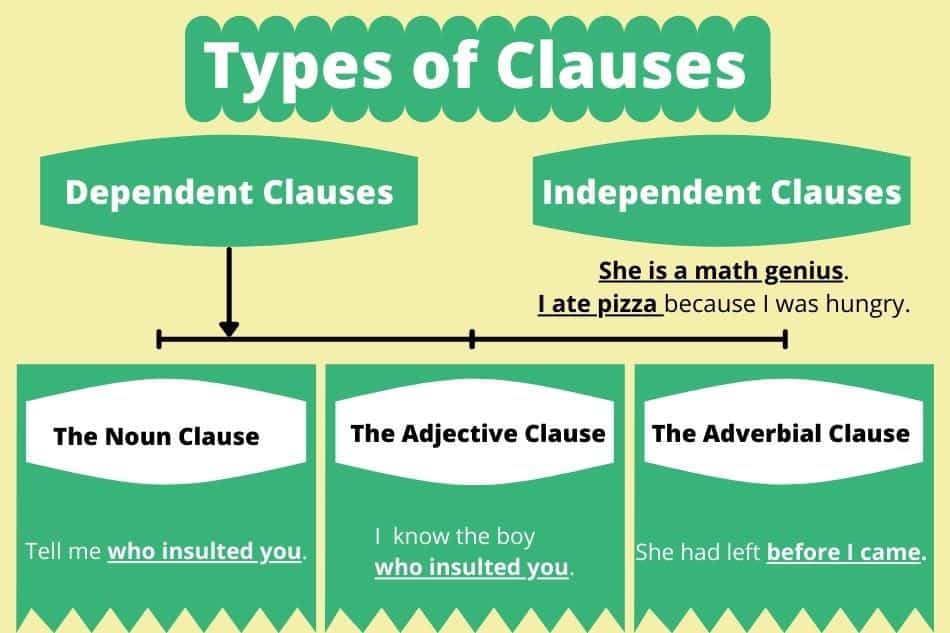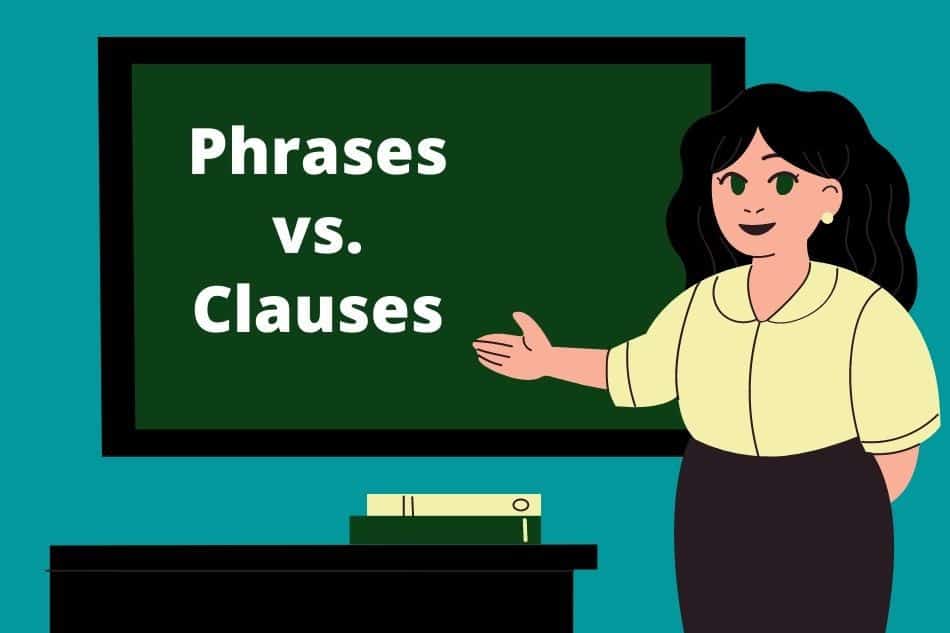This article covers the following areas –
- Comparison Table: Phrase vs. Clause
- Seven Most Common Types of Phrase: Definition, Explanation & Example
- Two kinds of Clauses: Independent and Dependent
- Final Notes
Phrases and clauses are two significant grammatical items in English. Simply put, phrase and clause both are a group of words that are found as parts of sentences with differences in their function and structure. I see many of my ESL students find it difficult to distinguish between a phrase and a clause.
Worry not! We will find the fundamental differences between a phrase and a clause initially in this post. Later on, we will have a detailed discussion on the characteristics, structure, and function of different clauses and phrases with relevant examples.
A phrase is a group of words with no subject or verb, whereas a clause is a group of words containing a subject and the main verb. Phrases can help to make the meaning of a sentence more precise, but they cannot create a complete sense or meaning as clauses can do. A clause itself can be a complete sentence, while a phrase can only be a part of a clause or a sentence.
Try The Blue Book of Grammar and Punctuation: An Easy-to-Use Guide with Clear Rules, Real-World Examples, and Reproducible Quizzes (Amazon Link) to understand the major rules and subtle guidelines of English grammar and usage. This best-seller includes easy-to-understand rules, abundant examples, dozens of reproducible quizzes, and pre and post tests for middle and high schoolers, college students, ESL students, homeschoolers, and more.
Comparison Table: Phrase vs. Clause
| Phrase | Clause |
|---|---|
| A phrase is a group of words. | A clause is also a group of words. |
| Subject and verb are not parts of a phrase. | Subject and verb are the mandatory elements of a clause. |
| The phrase is a part of a clause. | The clause is a part of a sentence. |
| A phrase cannot act as a complete sentence. | A clause can act as a complete sentence. |
| Phrases cannot make any complete sense or meaning of their own. | Clauses can make complete sense or meaning of their own. |
| A phrase always functions as a single part of speech (noun/adjective/preposition etc.). | A clause may function as a complete speech. |
| Example: The students of this batch are attentive. Note: “The students of this batch” is an example of a phrase in this sentence. | Example: The students of this batch are attentive. Note: The whole sentence is an example of a clause here. |
I already have defined phrases and clauses and have shown the differences between them in the above part of my post. Now let us talk about different kinds of phrases and clauses. If we can clearly understand all types of clauses and phrases individually, I believe it will be easier for us to understand the ultimate differences between phrases and clauses.
Seven Most Common Types of Phrase: Definition, Explanation & Example

We already know from the above table that a phrase functions as a single part of a speech. Thus, a phrase can act as a noun, verb, adjective, adverb, preposition, participle, or infinitive. Based on the function of a phrase in a sentence, there can be different kinds of phrases. In this part of the post, I will discuss seven different types of phrases.
1. The Noun Phrase
From a structural point of view, we can define a noun phrase as a group of words with a noun as its head (main word). On the other hand, from a functional point of view, we can define a noun phrase as a group of words that function/works/acts like a noun.
Example 1: The players of this team are stronger.
Here, “The players of this team” is a noun phrase because the head or main word of this phrase is “players,” a noun. Thus the structure of the phrase clearly indicates that it’s a noun phrase.
Example 2: To swim is good for health.
Here, “To swim” is a noun phrase because the phrase functions as a noun, though the head of the phrase is a verb. If the phrase as a whole acts as a noun in a sentence, we can consider the phrase as a noun phrase, no matter which word class the head of the phrase belongs to.
Note: A phrase can be a noun phrase both structurally and functionally, as we find in the first example, “The players of this team.” This phrase has a noun as the head; that’s why it is a noun phrase structurally. Similarly, the phrase also functions as a subject/noun of the sentence; thus, we can consider it as a noun phrase functionally.
However, in many cases, a phrase may not be structurally a noun phrase; still, it can be functionally a noun phrase. As we notice in example 2, “To swim” doesn’t have any noun as its head, but it is still considered a noun phrase since the phrase as a whole functions as a noun phrase.
2. The Verb Phrase
A phrase that consists of a group of words and functions like a verb is called a verb phrase. Usually, a verb phrase has two different parts: auxiliary and lexical. There can be more than one auxiliary verb, but a single main verb/lexical verb is considered the head in a verb phrase. Let’s see an example.
Example 1: I am writing an article on phrases.
Here, “am writing” is a verb phrase because the phrase functions as a verb. “am” is the auxiliary verb in the phrase, and “writing” is the main/principal/lexical verb or head.
Note: The usual verb phrase structure is that there can be one or more auxiliary verbs before the principal verb or head, but there will be no other words after the head. However, there are some exceptions. We will talk about them now.
Example 1: We should respect the younger people too.
Example 2: We should have respected the younger people too.
In example 1, we find a modal auxiliary “should” and simple infinitive “respect” as the lexical part of the phrase. However, in such a structure, we can have perfect infinitive as the lexical part as we find in example 2, “should have respected.”
These two types of infinitives (simple & perfect) may have their passive form too.
Example 1: It should be done by tomorrow.
Example 2: It should have been done by yesterday.
Note: The above verb phrase structures that we have discussed are also called complex verbs. But don’t get confused with complex verbs with phrasal verbs. They are different in terms of their structure. Let me give you a brief but clear idea about phrasal verbs now.
Phrasal Verbs
Phrasal verbs, also known as compound verbs, are a particular group of words that consists of a verb and an adverb, or preposition or both, and together work as a verb. There are three possible structures of a phrasal verb.
Example 1: He has turned up this time like always.(Verb/head + adverb)
Example 2: The committee is looking into the problem. (Verb/head + preposition)
Example 3: I cannot put up with such atrocity. (Verb/head + adverb + preposition)
Note: We can use auxiliary verbs before phrasal verbs as we use them before complex verbs. In the above examples, has, is, and cannot are such three auxiliary verbs.
Remember! There are some verb phrases without any specific structure, which are known as verbal idioms.
Example 1: They explored every avenue to repair the computer. (Explore every avenue: try every method)
Example 2: I believe my brother will finally carry the day. (Carry the day: win)
Example 3: We shall do or die to win the game. (Do or die: do everything possible)
3. The Adjective Phrase
A group of words that functions as an adjective is called an adjective phrase. An adjective phrase modifies or gives information about a noun or a pronoun. As a grammatical unit, it can work as a complement in a clause.
Example 1: The sailors were brave enough to survive the storm.
Here, the phrase “brave enough” is an adjective phrase since it modifies the noun “sailors.”
Structurally, the head of an adjective phrase is always an adjective. However, that head may have a modifier before it, a qualifier after it, or both modifier and qualifier. There are three possible structures of an adjective phrase.
Example 1: Our leader is very sincere. (Modifier + adjective/head)
Example 2: My course teacher was kind enough to help me. (Head/adjective + qualifier)
Example 3: The fishermen were very passionate indeed. (Modifier + head/adjective + qualifier)
Note: In an adjective phrase, both the modifier and qualifier are adverbs.
4. The Adverbial Phrase
An adverbial phrase is a group of words that works as an adverb in a clause. Like adverbs, adverbial phrases also modify verbs and are used as an adverbial complement or adjunct in a clause.
Example 1: They work so quickly.
In the above example, the phrase “so quickly” is an adverbial phrase since it modifies the verb “work.”
In an adverbial phrase, the head is always an adverb. However, like the adjective phrase, an adverbial phrase also may have a modifier before it, a qualifier after it, or both modifier and qualifier. There are three possible structures of an adverbial phrase. Let’s see the structures with examples.
Example 1: He walks very fast. (Modifier + adverb/head)
Example 2: The horse is running fast enough. (Head/adverb + qualifier)
Example 3: They work quite fast indeed. (Modifier + head/adverb + qualifier)
Note: In an adverbial phrase, besides the adverb as head, both the modifier and qualifier are adverbs.
5. The Preposition Phrase
We know that prepositions are words used with nouns, pronouns, and gerunds to connect them with other words in the clause. Structurally, the head of such a phrase is always a preposition, and that head takes a noun, pronoun, or gerund as completive.
Example 1: My brother is now at university. (Preposition/head + noun)
Example 2: My uncle stays with us. (Preposition/head + pronoun)
Example 3: No one from our group has any objection to swimming. (Preposition/head + gerund)
Note: The head of a preposition phrase is called “prepend,” and anything (noun/pronoun/gerund) used with it is called completive.
Remember! In most preposition phrases, the “prepend” sits beside the completive. However, in some cases, especially in informal English, “prepend” may sit far from the “completive.” Let’s clear the concept by looking at some examples.
Example 1: Who are you talking with?
Example 2: Where are you from?
Example 3: What are they talking about?
6. The Participle Phrase
When a group of words consists of a participle as its head, it is called a participle phrase. This head/participle, also known as the participial head, forms a participle phrase by taking different types of words or phrases after it.
Example 1: I found him going home. (Participle + adverb)
Example 2: I saw the dog eating the bread. (Participle + noun)
Example 3: I checked the letter typed by her. (Participle + preposition phrase)
Example 4: I found her feeling afraid. ( Participle + adjective)
Note: In the above examples, participle phrases have been shown as individual grammatical units. However, they can also be used as part of other phrases.
Example 1: The boys playing cricket are my students.
Here, “The boys playing cricket” is a noun phrase, and within that noun phrase, we find “playing cricket” as a participle phrase. Since this participle phrase modifies the noun “the boys,” we can also call it a participial adjective phrase.
7. The Infinitive Phrase
The infinitive is the base form of a verb with “to” or without “to.” When an infinitive is used as an individual grammatical unit in a clause, we can consider it an infinitive phrase.
Example 1: Please allow him to come. (To infinitive)
Example 2: Please let her come. (Bare infinitive)
However, when an infinitive acts the role of a head in a group of words, we notice other words after the head/infinitive. Let’s look at some examples.
Example 1: He allowed us to sit here.
Example 2: I called him to talk about a matter.
Note: In the above examples, the infinitive phrases are found as individual grammatical units. However, they can also be part of other phrases.
Example 1: The players to be selected are fortunate.
In this example, “The players to be selected” is a noun phrase, and “to be selected” is an infinitive phrase that is a part of the noun phrase.
Two kinds of Clauses: Independent and Dependent

We already have come to know from the comparison table that a clause is a group of words that must have a subject and a finite verb. Also, a clause can form a sentence or become a part of a sentence and may function as a noun, adjective, or adverb.
If you are looking for a brief idea about the clause, you may check A Quick Guide on Clauses: Definition, Classification with Examples. And to get a clear and detailed idea about different kinds of clauses, keep reading the post till the end.
1. Independent Clause: Definition, Explanation, and Example
A clause that can be used on its own is called an independent clause. That means an independent clause can express a complete sense by making a complete sentence of its own. Independent clauses are also known as the principal or main clauses.
Example 1: He is an outstanding student. (One-clause sentence)
Example 2: I know that he is an exceptional student. (Two-clause sentence)
In example 1, we notice that a single and independent clause makes a sentence. This type of one-clause sentence is called a simple sentence. But in the second example, we see two clauses in the sentence. One is “I know,” and another is “that he is an exceptional student.”
“I know” is an independent clause here since it can make sense independently. On the other hand, the other clause doesn’t make any sense without the help of the independent clause. I will talk about that other clause in detail in the next segment of the post.
2. Dependent Clause: Definition, Explanation, and Example
When a clause is used with another clause to form a complex sentence, we call it a dependent clause. That means a dependent clause cannot make any sense of its own without the help of any independent clause. Dependent clauses are also known as subordinate or conditional clauses.
Example 1: He called me because I wanted to go with him.
In the above example, there are two clauses. “He called me” is an independent clause since we can use this clause independently. This clause doesn’t need to depend on the other clause to make sense.
In contrast, the other clause, “because I wanted to go with him,” is a dependent clause since it cannot make any sense without being dependent on the other clause of the sentence.
Whether a sentence is simple or complex, or compound depends on the number of clauses. To know about different kinds of sentences based on their structure read my another article on that.
Based on the function of dependent clauses in sentences, we can have three kinds of dependent clauses.
1. The Noun Clause
Any dependent clause that is able to function as a noun is called a noun clause.
Example 1: I believe that he can do it.
In this example, the clause “that he can do it” is a dependent clause that acts as the object of the independent clause. That proves, it is a noun clause.
2. The Adjective Clause
When a dependent clause can act as an adjective, we call it an adjective clause. In other words, if any dependent clause modifies any noun in a sentence, it is called an adjective clause.
Example 1: He knows the boy who took the money.
Here, the clause “who took the money” is a dependent clause that acts as a modifier of the noun of the principal clause, “the boy.” Thus it is an adjective clause.
3. The Adverbial Clause
If a dependent clause works as an adverb, it is called an adverbial clause. That means, if a dependent clause modifies any verb in a sentence, it is called an adverbial clause.
Example 1: The train had left before I reached the station.
The example shows the dependent clause “before I reached the station,” modifying the verb of the independent clause “left.” That means the dependent clause of the given example sentence is an adverbial clause.
Final Notes
Phrases and clauses are mandatory elements of any sentence. Yet, many of us get confused to identify them and use them correctly in sentences. The reason behind this confusion is that both phrases and clauses have similarities and dissimilarities. I suggest remembering the most significant difference between them.
- A phrase doesn’t contain any subject or verb.
- A clause must have a subject and a finite verb.
I hope this will help you to understand everything about phrases and clauses.
Thanks for reading.
Happy learning!





